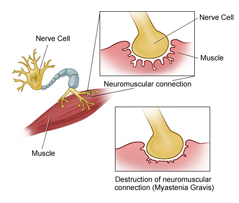Myasthenia Gravis

Myasthenia gravis is a an autoimmune neuromuscular disorder which occurs when the immune system mistakenly attacks healthy tissue. In people with myasthemia gravis, the body produces antibodies that block the muscle cells from receiving messages (neurotransmitters) from the nerve cell. Certain muscles that control eye and eyelid movement, facial expression, chewing, talking, and swallowing are often associated with the disorder. The muscles that control breathing and neck and limb movements may also be affected. The exact cause of myasthenia gravis is unknown. In some cases, it may be associated with tumors of the thymus. Myasthenia gravis can affect people at any age. It is most common in young women and older men.
The muscle weakness can lead to a variety of symptoms, including:
- Breathing difficulty
- Chewing or swallowing difficulty
- Difficulty climbing stairs, lifting objects
- Difficulty talking
- Drooping head
- Facial paralysis or weakness of the facial muscles
- Double vision
- Difficulty maintaining steady gaze
- Drooping eyelid
Treatment
Treatment may allow you to have prolonged periods without any symptoms Lifestyle changes such as avoiding stress and heat exposture and resting often help you continue your daily activities.
Medications that may be prescribed include:
- Neostigmine or pyridostigmine
- Prednisone
Surgery to remove the thymus (thymectomy) may result in permanent remission or less need for medicines, especially when there is a tumor present. Patients with eye problems may try lens prisms to improve vision. Surgery may also be performed on the eye muscles.
 Alzheimer's Disease
Alzheimer's Disease